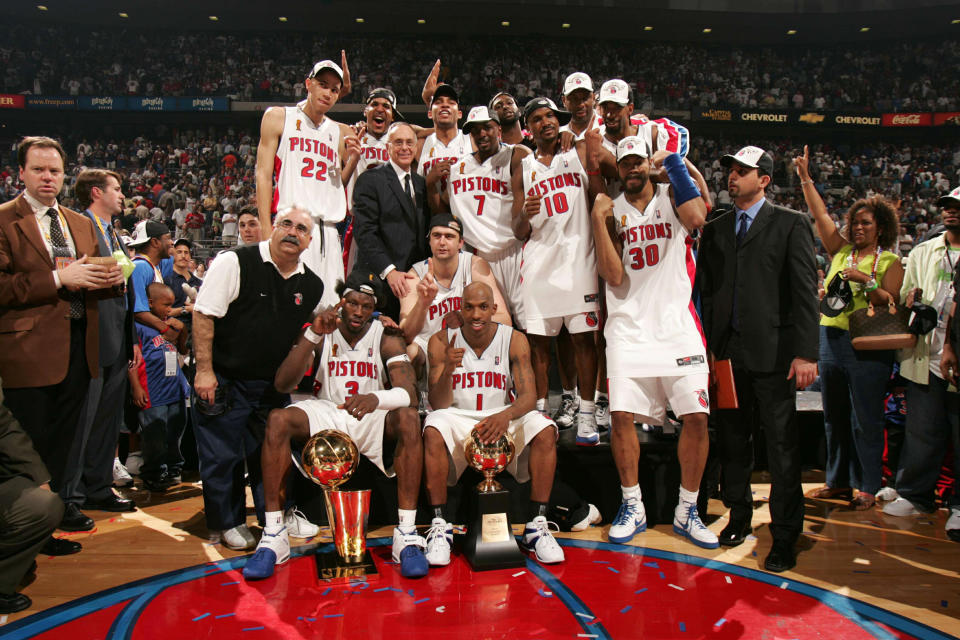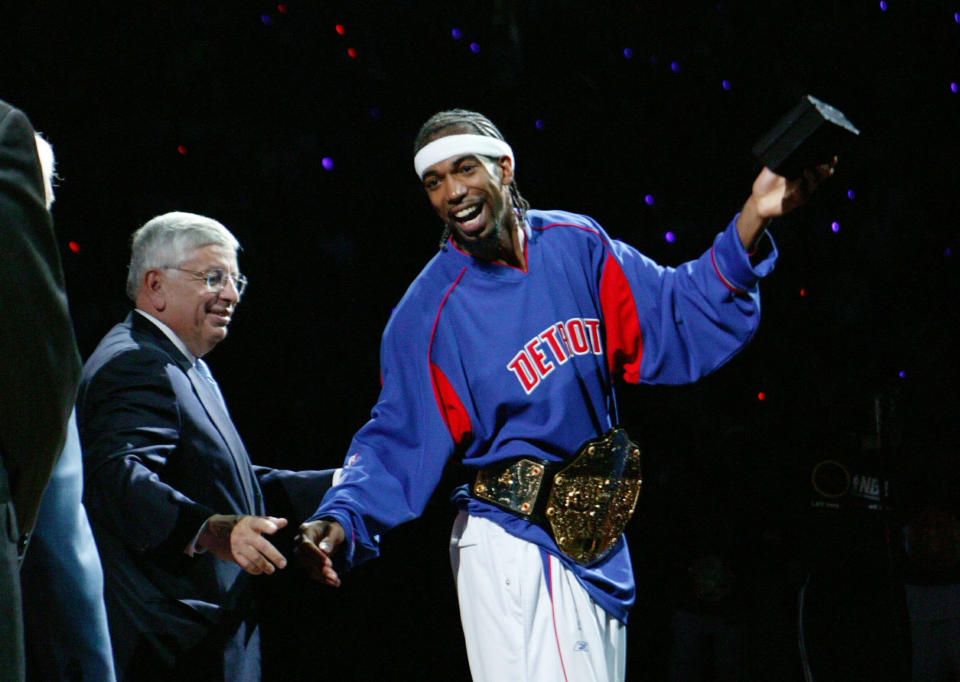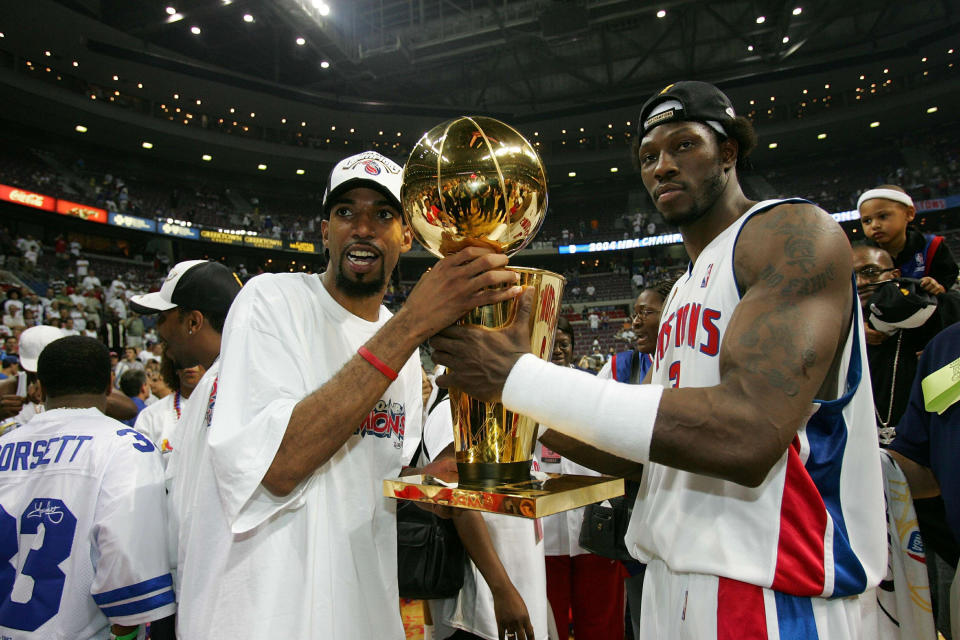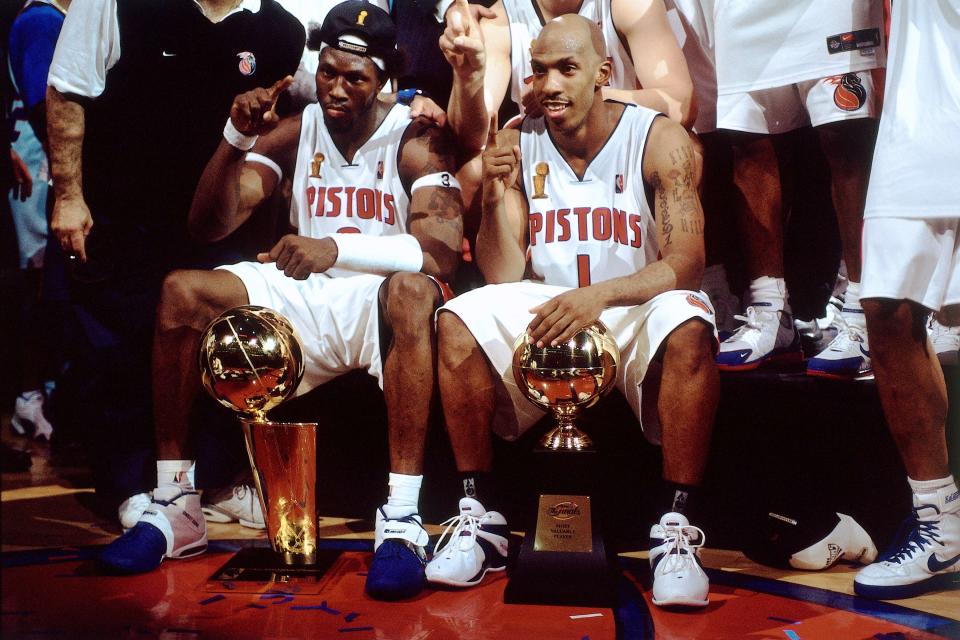Why the 2004 NBA champion Detroit Pistons are still so important
DETROIT — It was a perfect team for a perfect time, one that couldn’t be duplicated in its own era and certainly not in the age of “Super Friends” aligning to wreck the league.
But the 2004 Detroit Pistons stand out uniquely, a superstar-less team that wasn’t any less complete than any of its predecessors, successors or peers. Time hasn’t diminished the Pistons’ standing as the most surprising champion in modern NBA history.
They were a bunch of castoffs, players who’d been passed around, skipped over and dismissed by other organizations who managed to come together in Detroit — bonded by collective failures, mischaracterizations and a maniacal competitiveness that looked like arrogance wrapped in resilience.
They rolled over a star-studded Los Angeles Lakers team led by Shaquille O’Neal and Kobe Bryant in a shocking five-game romp, cementing themselves in history.

No stars, few frills.
But they had personality, ego and a hunger that belied the city they played in as Detroit battled recession before it hit the rest of the nation.
“From the masses, we didn't have a top-five player, top-10 player, to what the people thought,” Chauncey Billups told Yahoo Sports on Sunday as the team reunited to commemorate the 15th anniversary of the franchise’s third championship. “But if you ask people who played against us, there was nothing but respect. We played on that, we really did.”

They coined the phrase “best five alive,” signifying their balance and cohesiveness. The WWE-style championship belts following their title win were equal part an answer to a perceived lack of respect and a reminder to contenders that wins wouldn’t come easy, if at all.
The foundation of a champion
The championship blueprint had been forged in the previous era by the bruising Bad Boys teams and replicated by team president and charter Bad Boy member Joe Dumars.
It wasn’t so much that Dumars and the Pistons didn’t want superstars; there just weren’t many in that era compared to today’s talent-heavy league, so things had to be done differently.
“It wasn't about stars. It was about quality players, two deep at every position,” said current Knicks general manager Scott Perry, who was an executive under Dumars at that time. “That was a big part of Joe's philosophy. We would take 10 very good players over teams that didn't have it.”
The Pistons whiffed on a superstar with the second overall pick in the 2003 draft, selecting Darko Milicic over Dwyane Wade, Chris Bosh and Carmelo Anthony. It didn’t hurt them that season, making the title even more impressive when one considers the Pistons remain the only NBA champion who didn’t go into the luxury tax.
“The evaluation of our talent was led by Joe's leadership. We were very in tune to that,” Perry said. “A lot of things came together at the right time, when we got certain players, they were starting to come up. All those guys outperformed their contracts.”
Even before adding Rasheed Wallace — the man who dubbed himself “team megaphone” — at the trade deadline, the group played with a confidence that wasn’t indicative of their pedigrees.
“We [always] felt like the favorites,” Billups said. “We didn't listen to what everyone else was saying. We didn't care about the names that was over there.”
Billups came with the highest pedigree as the third overall pick of the Boston Celtics in the 1997 draft but was traded midway through his rookie year, starting a cycle that saw him in more transaction packages than highlight reels as he suited up for five teams before signing with the Pistons as a free agent in 2002. He actually only played for four teams because he was a throw-in to a trade to Orlando in 2000 and wasn’t even a consideration to play for a franchise.
It was there, though, where he encountered someone trying to find his own way, an undersized big man named Ben Wallace. The two bonded over the uncertainty in their careers, confident teams were missing something special.
They were certain their paths would cross again but headed in different directions. Wallace was small-level compensation in a sign-and-trade deal as Grant Hill left Detroit for Orlando months later, and Billups joined Minnesota where he would finally find some traction under the late Flip Saunders.

When free agency came up two summers later, Billups noticed the growing identity in Detroit, where his old friend turned into a defensive wizard, winning the NBA Defensive Player of the Year Award for the first of four times.
“I came here because of Ben Wallace and Corliss Williamson, the team was ascending,” he said. “I felt they were a good point guard away from that next level. I stepped out and bet on myself and it worked out.”
A short time later, Richard Hamilton was acquired as part of trade that sent Jerry Stackhouse to the Washington Wizards. Like with Wallace, Billups bonded immediately with his new backcourt mate.
“Ty Lue was my point guard in Washington, so when I got traded, he told me, ‘You and Chauncey are gonna hit it off. He’s gonna take care of you,’” Hamilton said.
The ever-confident Billups saw his perfect complement, much in the same way Dumars and Isiah Thomas played off each other during their back-to-back title runs in 1989 and 1990.
“He was the energizer bunny, running all over the place,” Billups said. “I wasn't playing with that energy, I needed that. And he needed my calm.”
The pieces came together their first year in a run to the 2003 Eastern Conference finals, particularly when rookie Tayshaun Prince was removed from moth balls to help bring the group back from a 3-1 deficit in the first round against the eighth-seeded Orlando Magic.
The skinny rookie had his own grievances, even though his road wasn’t as painful as his teammates’.
“You know Ben's situation where he was fighting to get in the league,” Prince said. “Chauncey had been traded a lot. You could put me in that situation. I fell to [No. 23 overall] in the draft because people thought I wasn't strong enough to play in this league, and I stayed in college too long, so to speak. I was kind of in the same boat as they were.”
Forging an identity
They all learned to lean on each other, especially Billups when Larry Brown replaced Rick Carlisle as head coach in 2003 and made his life miserable for the first few months. In Brown’s eyes, Billups couldn’t do right. Even his triumphs were criticized as play not worthy of a Brown point guard.
“Aw, man, aw. It was rough early on,” Billups said. “L.B. never coached a scoring point guard. A.I. [Allen Iverson] was a scoring point guard, L.B. moved him to the two. He couldn't do that with me. He never coached anyone like me, that's why it was so tough.”
It was a tough transition for the well-traveled Brown, too, who normally moved from reclamation project to reclamation project, building it up before heading onto the next challenge.
“You know, I never took over a winning team before,” he said.
In fact, Brown watched Billups begin his lore as “Mr. Big Shot” the spring before, when Billups knocked out Brown’s Philadelphia 76ers in the second round with back-breaking threes in the series clincher. When Billups was asked if that played a role in Brown’s early treatment, he merely laughs. “But I'd jump off a bridge for L.B. He means that much to me, he taught me so much,” he said.
Brown’s teaching was made easier by a full roster. Mehmet Okur was a sweet-shooting big man finding his way in his second year. Williamson was a recent Sixth Man of the Year. Mike James and Lindsey Hunter were hell-raising backup guards who pressured teams into turnovers that started fast breaks on a team that, while versatile, still struggled to score 90 most nights.
Then when Dumars pulled the trigger to acquire Rasheed Wallace at the deadline, things got real.
“Even before we got Sheed, I knew we were on the up and up,” Prince said. “I wasn't seasoned enough to know exactly what we needed, but I knew we had aspirations. But I knew the minute he walked in the door, it only took a couple games and I knew we had something special.”
As special as it was, aesthetically pleasing it was not, except to the purists who loved intense defense and good ball movement. For five straight games they held opponents to under 70 points — a mark that won’t soon be duplicated in today’s offensive NBA.
As quick as it came together, the road to June and through it was arduous. The Pistons made a habit of finding danger then pulling themselves from the brink, emboldened by the exhilaration and the feeling of invincibility.
The road to the title
Even though Billups sent Game 5 of the conference semifinals into overtime with a buzzer-beating 40 footer, it wasn’t enough to keep the New Jersey Nets from sending the series back home in a triple-overtime thriller that put the Pistons one game away from elimination.
But they picked themselves up to win Game 6 in New Jersey and rolled in Game 7.
And after giving away the first game of the conference finals to the Indiana Pacers, another rugged team with just enough talent and similar swagger, Rasheed Wallace delivered a bold statement in guaranteeing a Game 2 win.
“What did he say? ‘Front page, back page, middle of the page,” Ben Wallace said of Rasheed. “That man was crazy.”
Perhaps crazy as a fox as the Pistons stole Game 2 on the long stride and even longer arms of Prince, who tracked down Reggie Miller for a game-saving block that, until LeBron James’ block of Andre Iguodala in Game 7 of the 2016 Finals, was universally acknowledged as one of the best defensive plays in NBA history.

Even then, it was hard for some to see this run as destined. “It was a huge play when you look back on it, and it turned that particular series,” Perry said. “But I don't think we looked at it at the time, we were still staring at the Los Angeles Lakers. So I don't know if you take that big of a leap of faith.”
Billups thought otherwise and wasn’t shy about expressing it.
“Very confident,” Billups said. “It was all about matchups in the playoffs. I had my matchup. I knew we had a favorable matchup. If me and Rip could get any shot we wanted, we could win the series.”
From there, Brown had to finally turn Billups loose, and he ran circles around Gary Payton and Derek Fisher. Even squandering Game 2, when Brown didn’t want to foul while up three led to Bryant sending the game into overtime and the Lakers tying the series, couldn’t dampen Billups’ confidence.
He boldly told his coach on the team bus to perk up, that going back to the raucous Palace of Auburn Hills would change matters.
“That heartbreaker, where a lot of people picked against us, they thought L.A. would roll over us,” Perry said.
They kept Ben Wallace on O’Neal solely, but swarmed Bryant. It was a formula the San Antonio Spurs and Minnesota Timberwolves — two teams the Lakers dispatched previously — couldn’t perform as well as the Pistons.
“I swear on everything I thought we would win before the start,” Billups said. “After Game 1, there was no way they could beat us. No way. We couldn't guard Shaq one on one. Can't guard Kobe one on one. As a unit? They weren't gonna score enough points to beat us.”
It held true as the Pistons rolled in front of a thirsty home crowd, even taking a 29-point lead in the decisive Game 5 that was more celebration than competition by the end of the third quarter.
Billups was named Finals MVP, completing an unlikely journey that saw him cemented as a star, a leader and a point guard in a soon-to-be-changing NBA.
The Pistons take their place as a power
It was near the start of a run that saw the Pistons reach the Finals again and make the East finals every year through 2008.
“You gotta think, we were so young,” Hamilton said. “I was 25, Chaunce was 27. We had good years ahead of us.”

They could never reach the apex again, losing to the Spurs in the 2005 Finals and then later unable to counter star-led teams by Dwyane Wade and LeBron James the next two seasons in the conference finals. But they were teachers to both, gatekeepers of Eastern supremacy for nearly a decade.
“We talk about it all the time. For sure, two [titles] but we should've had three,” Billups said. “I feel like we underachieved. I know it sounds crazy because winning championships are so hard.”
Ben Wallace coming up short in the Hall of Fame balloting assures this group will hold the distinction of being the only champion in the modern era without a Hall of Famer … for at least one more year. Even if he does make it in, he’ll hold the lowest scoring average of any inductee enshrined solely for his accomplishments on the floor.
As the team reunited for a weekend in Detroit, old roles were resumed. Billups and Hamilton palling around. Prince and Ben Wallace trading jokes. Rasheed Wallace broke his foot a few days prior to the reunion and surgery prevented his attendance. Dumars hasn’t come to any team function since parting ways with the franchise in 2014, to the dismay of many.
Billups found himself addressing the crowd, like Isiah Thomas did the week before at the Bad Boys’ 30-year reunion. But, unlike the Bad Boys’ run, the triumph came early, followed by the struggle.
It’s what makes this group stand out relative to any other, even though the players feel their talent would translate.
“Man, listen. The way the game is today … everybody could shoot, except for Ben,” Billups said. “It's a shooting game. All we do is play faster. You know we're still gonna play D. It's a switching league, we'd just switch everything. It would be an easy transition for us.”
Even if the argument would rather be kept to Twitter and what-if discussions, the one thing that remains is what this team meant to the city and the league, even if the latter didn’t embrace them as much.
“What we did will never be done again, in the fashion that we did it,” Billups said. “What we did can never be undone. We take pride in that. We're happy about that.”
More from Yahoo Sports:


